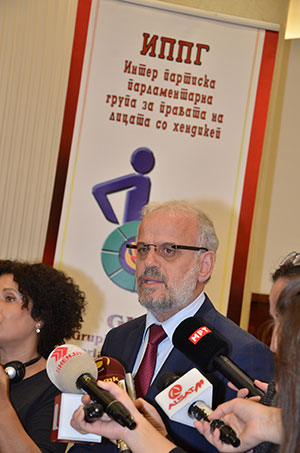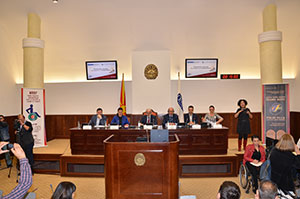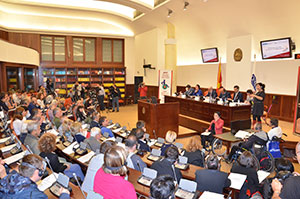 Thursday, 28 September 2017
Thursday, 28 September 2017
Address of the President Xhaferi at the Debate on “Political Participation of People with Disability”
Ladies and gentlemen,
Colleagues, MPs,
Distinguished Representatives of the Representatives of OSCE to Skopje,
Distinguished Representatives of the NGO Sector,
On 6th September, here in the Assembly of the Republic of Macedonia the Interparty Parliamentary Group for the Rights of the People with Handicap was established. This Group is not a classic body of the Assembly, such as the Assembly Committees, Parliamentary councils or others, but it is a parliamentary lobby group whose name clearly indicates that the Group goes beyond the party affiliation of its Members, as well as the classic political division present in this Assembly, in other words the majority and the opposition. As a President of the Assembly I am pleased that my colleagues, MPs, Members of this Interparty Lobby Group, together with the OSCE Mission to Skopje and Polio Plus – NGO, are organizing this debate only ten days after the first Meeting.
The topic of today’s debate is “Political Participation of People with Disabilities” which is one of the fundamental issues when we speak of overall social integration of these citizens. In the same time the chosen topic matches the current political momentum in the state, the local elections and the pre – election campaign that started this week. Namely, the political participation of the people with handicap is no less than part of the fundamental human rights and freedoms. Here, I do not refer to the right to elect and to be elected, but beyond. In other words, active participation of these citizens of ours in the creation and realization of the policies. Let us not forget that all of this, for us, who are part of the politics, is an obligation the Constitution, laws and numerous international documents adopted in the framework of UN, CE, EP are based on. Nevertheless, the most important, in my opinion is that we must never forget when we speak of protection and overall integration of these citizens, is the fact that this is our moral and civilization obligation. Let us not forget that the marginalization of these people is often based on stereotypes and prejudice. Still, this is a topic that the psychologists and experts must refer more to.
 Dear friends,
Dear friends,
If we consider the normative establishemnt in the Republic of Macedonia when the protection of people with handicap is considered, i believe that it is well proscribed. If I remember well, in July 2003, the Assembly of the Republic of Macedonia adopted a Declaration for Protection and Promotion of the Rights of People with Handicap. As a state, we have adopted a “National Strategy equalizing the rights of the People with Handicap in the Republic of Macedonia”. Now, we come to the point, if we may refer to, the handicap of each young democracy – the implementation of the agreed and adopted items. How can we surpass this? Even though we are a young democracy, we are aware that through the parliament and its functions, representative, legislative and oversight, we can identify the open issues, flaws and problems, and immediately, using all mechanisms of the modern parliamentarism, solve the mentioned problems. As I said at the beginning, three weeks ago, the Inter Party parliamentary Groups for People with Handicap was established, today we participate in the first debate for a significant topic “Political Participation of People with Disabilities. This demonstrates that the current parliamentary composition seriously continues its work for overall integration of people with handicap, people who are not different from us.
 Distinguished,
Distinguished,
The General Assembly of UN in 1992 proclaimed 3 December as international day of People with Special needs. I am convinced that this year the Day will be marked through different events, and I personally believe that we will be more fulfilled if through our work until then manage to make an amendment to a Law that will facilitate the daily lives of the people with handicap. We will be more pleased if as a Parliament and as Interparty Lobby Group, together with the NGO sector manage to initiate the employment process of the state and local self governance institution for the people who know the sign language and people with damaged hearing/ There are many areas for actions, education, culture, employment, health care, rehabilitation…
In all these activities, actions and policy making processes, I believe people with handicap, NGO sector and every citizen will be included, liberated from prejudice, stereotypes, to see it neighbour and co – citizen with special needs. In other words, creating policies of this kind; building society where handicap’s full integration is considered equality, rather than exclusion and marginalization of people with handicap.